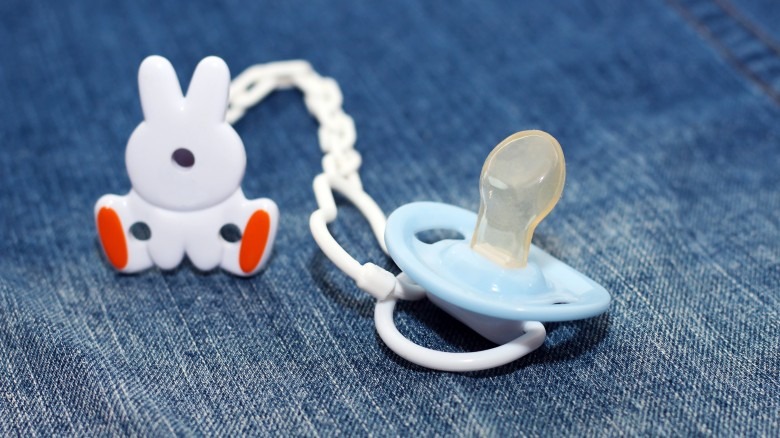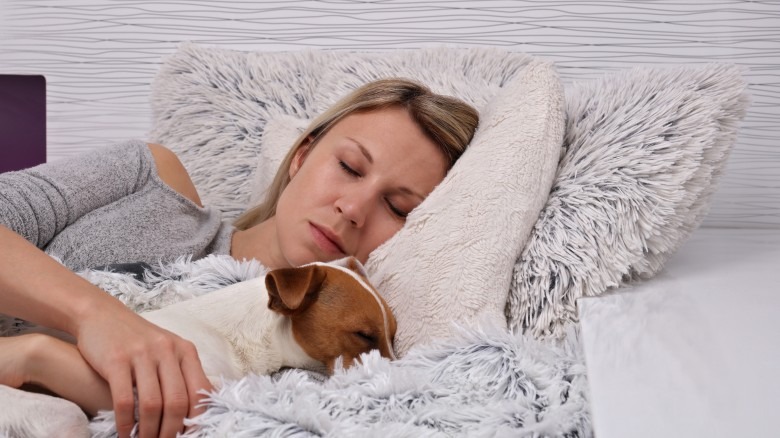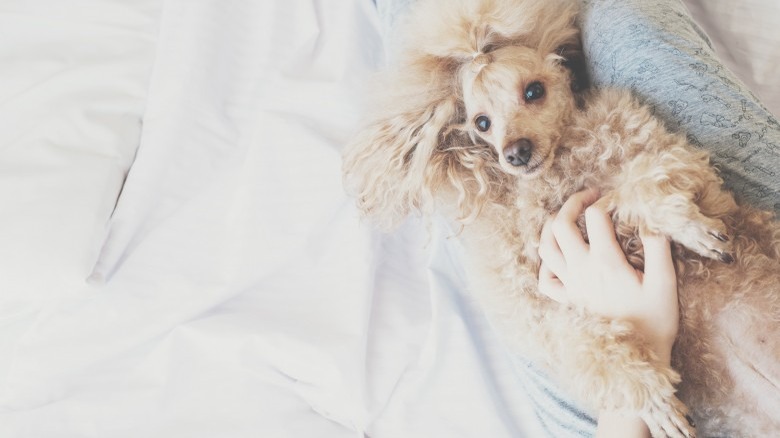Reasons Your Pets Shouldn't Sleep In Your Bed
Having a pet can be wonderful for your health. That wagging tail when you walk in the door not only makes you feel good — it probably encourages you to live a healthier lifestyle. No matter the weather, you know you have to take two walks per day. Maybe you don't stay out at the bar with your friends too late because you know you need to get home to let Fido out.
Having a pet has been associated with lower blood pressure, lower cholesterol levels, lower triglyceride levels, and decreased feelings of loneliness.
While these traits are heartwarming, we have to draw the line somewhere. No matter how much you love your four-legged friend, sharing your bed is a bad idea. Disclaimer: I'm not a sleep-with-my-dog kind of gal. Humans belong in beds, animals on the floor. You're not going to convince me otherwise, especially after researching for this article!
However, I may be alone in that stance. In the United States, more than 60 percent of households have a dog, and of those dog owners, 50 percent allow their pets to sleep in bed with them. Of the 250 diseases that have been passed from animals to humans, 100 of those diseases came from domestic animals. That means your pets could be carrying some nasty diseases like parasites and staph infections.
Why do we sleep with our pets?
Once you make room in your bed for your furry friend, it can be hard to break the cycle for both of you. "Dogs add companionship if you are single or in a bad relationship," Susan Nelson, DVM, a clinical associate professor at the Kansas State University College of Veterinary Medicine, told Everyday Health. "They provide extra warmth on a cold night. They evoke a sense of security, especially for children who are scared of the dark. They give an added sense of safety from potential intruders. It may also create a greater bond between you and your dog. Let's face it: it's hard to beat a warm, furry bundle of unconditional love."
However, if you decide to let your pet cuddle up while your husband is out of town, it's common for that relationship to continue. And listen up, ladies, because we're the culprits. Studies show that 25 percent of women report sleeping with a pet, while only 16 percent of men do.
You could get bubonic plague
Yes, you read that right. Bubonic plague is not just for European history books. Cats and dogs can still carry the fleas that spread this disease, and sleeping next to them puts you at risk. When our pets share our beds, those fleas can jump off of their fur and onto our sheets.
From 1977 to 1998, there were 23 documented cases of human bubonic plague that could be attributed to the family cat! Sadly, five of these cases of the plague were fatal. Make sure your pet is getting regular trips to the vet to avoid these diseases in the first place.
Say hello to parasites
You probably are on top of your pet's health. You schedule those vet appointments, order that heartworm medication, and get those walks in. You know how sick your dog could get from a parasite like hookworm or roundworm, so being the amazing pet owner you are, you take care of it. However, have you done the same for you?
If your dog is already infected with a parasite like roundworm, the parasite's eggs are on his coat. When he snuggles up next to you, those eggs could shed off into your sheets and nestle into your skin.
You could get scratched
Cat-scratch disease is a serious one that usually occurs when you are scratched (get it?) by a flea-infested cat. This disease can make you pretty sick and can affect your liver, spleen, and kidneys.
And it doesn't matter if your cat doesn't actually scratch you. Just sleeping next to or being licked by your cat could be enough to pass the disease. Again, make sure your cat is healthy in the first place. Then let her sleep in her own bed or space in the house.
You're at risk for meningitis
You've probably heard of meningitis outbreaks breaking out on college campuses where everyone is living in such tight quarters. It turns out that your family pet could be carrying the infection, and the closer you get, the more at risk you are.
In 1985, a 60-year-old woman in the United Kingdom was diagnosed with meningitis after admitting to regularly kissing her dog on the mouth. In another meningitis case, a newborn baby was diagnosed after the family cat used the babe's pacifier as a toy. Ew!
Sleeping in bed with your pets not only makes it more likely that they will lick you. Simply being that close every night can get you sick.
Your pet could pass staph infections
Serious staph infections like MRSA can be passed from animals to humans. MRSA is a bacteria that is resistant to many antibiotics, making it difficult to treat. Dogs and cats can carry this bacteria in their mouths and saliva. Now you're going to need to sit down before I tell you this next one. And I hope you didn't just eat.
A 51-year-old woman in Japan was diagnosed with a staph infection that started in her ear. Doctors determined that her dog infected her when she let her dog lick her stitches from a recent ear surgery. No, just no.
Watch out if you have allergies
If you tend to have environmental allergies, make sure your pet doesn't sleep in your room, let alone in your bed. Not only could you react to your pet's dander and fur, but Fido has been rolling around in who knows what all day. Your dog is exposed to allergens like pollen and dust all the time
"You may not be allergic to your dog, but all dogs carry allergens," pet guide editor Amy Tokic told The Honest Kitchen. "They stick in his fur or on his paws, follow him to your bed, and cause your allergies to go haywire. Stuffy noses and sneezing does not make for a good night's sleep."
Chocolate on your pillow
I know what you're going to say. Your dog is special; she gets you. You two can communicate without saying a word, and she's basically a genius. But here's the thing: that genius just left a chocolate on your pillow. Oh, and it's not chocolate.
Dogs are natural scavengers and aren't afraid of playing with or eating their own poop. Your pet probably has some on her paws or fur right now, so when she sleeps in your bed, guess where it goes... yes, on your sheets, and then you. While of course this thought is unsettling, it could also make you sick.
Even more dangerous for your kids
After reading the risks, I'm betting you're at least considering kicking Fluffy out of your bedroom. If you're not quite ready to ditch your cuddle buddy, at least make sure your pet doesn't snuggle up in your baby or child's room.
Allowing your dog to sleep in a bedroom, especially your child's bedroom, can lead to possessive or aggressive behavior. Scientists have determined that a dog sleeping in a child's room is a risk factor for biting. According to the Centers for Disease Control and Prevention (CDC), from 1989 to 1994 there were 109 fatal dog bites, and 11 of those were to a sleeping infant. Bottom line: keep the kids' rooms off limits.
And watch out for that aggressive behavior in your room, too. If your dog starts growling at your husband when he tries to get into bed with you, it's time to make the bed a humans-only zone. "It may be because he thinks he's protecting you in this vulnerable position," Amy Tokic wrote in an article for The Honest Kitchen. "The bed can become the dog's territory, and anyone who's unwanted — in his eyes — won't be welcome in his domain."
There is one benefit
With all of the negative outcomes of co-sleeping with your pets, I worked hard to find out if there were any benefits. Turns out there may actually be one health benefit to sleeping with your pet: a better night's sleep. According to a study by researchers at Mayo Clinic, many pet owners believe their pets either don't affect or actually enhance their restful sleep. In their study of pet owners, 41 percent shared that their pet may help them get more beneficial sleep. "[Some people] find that sleeping with their animal actually helps them feel cozy. One woman said her two small dogs kind of warmed her bed. Another person felt her cat who was touching her during the night was comforting and soothing," Dr. Lois Krahn, a sleep medicine specialist at Mayo Clinic Center for Sleep Medicine in Arizona (and one of the paper's authors) told Today.
However, that comforting feeling isn't enough to cancel out all the bad. "I'm not sure that there's a hard and fast rule about pets [in bed]," explained Dr. Krahn. "My community of colleagues do think that it is just always a risk."
Goodbye, cuddle buddy
Even though these diseases like bubonic plague are rare, it's still something to think about. You're much more likely to get an animal disease from your pet from licking or kissing on the mouth, but sleeping next to each other still puts you at risk. Children, babies, and anyone with an immune problem should never share their beds with pets because it's just too dangerous.
Can't resist that furry bed companion? First, go back and reread this article. Still not convinced?
Know that disease transmission goes both ways. It's just as likely for you to infect your dog as the other way around. "It's not only animals giving infections to people, it looks like people can infect animals, too," Dr. Peter Rabinowitz of the Yale School of Medicine and co-author of the textbook Human-Animal Medicine: Clinical Approaches to Zoonoses, Toxicants and Other Shared Health Risks told HealthDay. "It's a two-way street."
You're still going to do it, aren't you?
I get it, your pet is part of the family, and these risks are rare. If you do choose to keep sharing your bed, make sure to be as safe as possible. Make sure your pet is getting regular trips to the vet and keeping up with any needed medications. Give her regular baths, and monitor for any signs of possessive or aggressive behavior.
Steve Brooks, a certified dog trainer and founder of SteveBrooksK9U in Los Angeles, has some simple behavioral rules for sharing your bed. "Your dog should be able to stay on the floor while you're in bed for at least 10 minutes, and then you should be able to invite your dog up on your terms," Brooks told Everyday Health. "Your dog should lay calm on the foot or the side of your bed without constantly pawing, nudging, or pushing. The bed is not a place to chew bones or play; it is a place for a calm massage or sleep. You don't want to find yourself on the edge of the bed or being pushed off the bed by your dog in the middle of the night. It then becomes the dog's bed, not yours."












